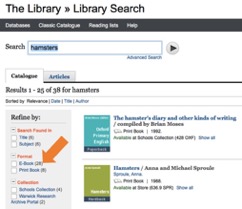Did you know there is more to the Library than a bricks and mortar building? So long as you have internet access you can use the millions of e-resources online via the Library website! Here are some tips on how you can keep using the Library while you study, research or teach remotely.
1. Get the most out of Library Search
Did you know the Library has 67,000 e-journals and 1.1 million ebooks for you to use at any hour of the day? To find e-resources quickly using Library Search all you need to do is to enter your search terms as usual, then use the filters on the left hand side of your results to only show e-books or e-journals. Simple!

2. Use Subject Databases
Library search is useful when you are looking for e-books or specific journals but it’s only the tip of the research iceberg. Continuing the iceberg metaphor, if Library Search is the tip then databases are the enormous base of the iceberg!
If you are looking for journal articles on a specific topic, data, newspapers, videos or other subject specific resources you will find them in one of our many databases. Some databases are subject or resource specific (like Westlaw or Theatre Online) while some are multidisciplinary (like Web of Science). They might feel like a vast, unexplored wilderness at times but prepare yourself for your expedition by grabbing a cup of tea and setting aside some time to have a browse. You’ll thank yourself later.
Trust us when we say databases contain reliable, high quality academic resources for your studies and will save you time and effort compared to searching through Google.

3. Set up Warwick Library Proxy
Speaking of which, if you do use Google (let’s face it, sometimes you just have to!) you can make searching quicker and easier by setting up Warwick Library Proxy on your browser. This means if you find a resource via Google or a direct link, all you have to do is click the plug in to log in with your Warwick University username and password. No faffing required!
4. Academic Support Librarians
If you don’t know where to start, or have done all of the above and are still feeling stuck then don’t panic, contact your Academic Support Librarian. They are currently working from home and are still available to answer any questions or queries you might have. They can help you find the right database for your research, suggest alternative resources and help with referencing queries. Don’t forget to also check out the subject support pages for guidance, resource recommendations and your Academic Support Librarian’s contact details!
5. Reading lists:
If you need a bit of inspiration don’t forget to check the reading lists for your modules. They will be full of ideas of what to read, where to start and have links to relevant online books and articles.
If you want to know more about how to use reading lists successfully we have a blog for that!
6. Your Library Online
Did you know the Library also has a number of free online courses as part of ‘Your Library Online’. These courses are designed to support your studies and help you to get the most out of the Library. You can unwind with the Mindful Library, brush up on Harvard Referencing with RefWISe or even get to grips with all of the different resources the Library holds with GetWIse.
Kirby has used (and approved) all of these courses and has even written a blog post about the things they learnt!

7. More Books – E-Books
Last, but definitely not least, our More Books – E-Books campaign will be running across the Easter vacation and term 3. It’s the More Books – Your Books campaign we all know and love, but exclusively for e-books!

Send in suggestions of the e-books which support your remote studying needs and we will beaver away to try and find them for you. A slight disclaimer; no matter how hard we try, not every book is available online but don’t despair, if this happens your Academic Support Librarians can help you to identify alternative resources for your studies.
